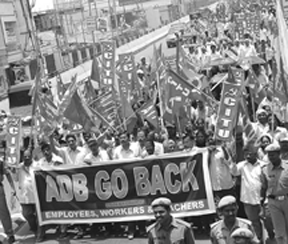 People's Democracy
People's Democracy
(Weekly
Organ of the Communist Party of India (Marxist)
No. 20
May 14, 2006
(Weekly
Organ of the Communist Party of India (Marxist)
|
Vol.
XXX
No. 20 May 14, 2006 |
ADB Meeting In Hyderabad Marked By Protests

THE
39th annual meeting of the governors of the Asian Development Bank (ADB) held in
Hyderabad was marked by protests of the working class and some of the
non-governmental organisations. The protests exposed the Bank's role of
subserving the vested interest of multinational corporations and endangering our
country’s economy by imposing anti-people conditionalities for sanctioning
loans for various programmes and projects of the central and state governments.
Coinciding with the
commencement of the four-day
meeting of the ADB on May 3, 2006, a massive rally of workers, employees and
teachers was taken out from Baghlingampally to Indira Park under the banner of
the United Forum of the Employees, Workers and Teachers, with the rallyists
raising resounding slogans of “ADB go back.”
As
a preparation to the protests, a state-level workshop was conducted on the March
20 in Hyderabad by APNGOs Association, TNGOs Association and AP Public Sector
Employees Federation. About 150
representatives participated in the workshop.
From the side of CITU R Sudha Bhaskar, P Ajay Kumar, A V Nageswara Rao, P
Aruna and R S Murthy presented papers in the workshop,
exposing the strategy of the ADB in pushing through the policies of
liberalisation, privatisation and globalisation in the supplicant countries and
states, resulting in disastrous consequences of trapping them in debt-trap and
imposing additional burdens on the people. They also explained the experiences
and consequences of neo-liberal policies imposed by the ADB as part of
conditionalities for sanctioning loans in different countries and various states
in India.
The ADB, World Bank and the International Monetary Fund, working as they are as agents of the imperialist countries, are making three-pronged attack on our country. Though the ADB has 57 countries as its members, it is mainly under the grip of the USA and Japan. With its strategy of policy-based lending, the ADB is pursuing the approach of encouraging the supplicant countries to create conditions favourable for entry of the private corporate houses, both indigenous and foreign, into infrastructure sector and their entry into the public sector projects. As a result of implementation of the conditionalities imposed by the ADB, subsidies for public services like electricity and water are being cut. In the name of recovering costs of these services, charges are being increased, drinking water supply is being privatised and agriculture is being left to the mercy of the market forces, as experiences in several countries have confirmed, a resolution passed by the workshop explained. The workshop also gave a call for holding protest rallies.
On
the call given in the workshop of the United Forum, regional conventions against
the ADB have been held in Vijayawada, Tirupati and Kurnool
and district-level conventions in Ranga Reddy, Srikakulamm, etc. Though
the leadership of state government employees did not show much interest, the
employees responded to the call given by the United Forum and participated in
the conventions with the initiative taken by the CITU.
Addressing
the public meeting held in Hyderabad on May 3,
after the rally of the United Forum reached Indira Park, S Veeraiah,
state general secretary of the CITU,
pointed out that while the erstwhile NDA government had fallen in the trap of
the ADB, the present UPA government has also been pursuing the same path of
reforms. He criticised the Rajasekhara Reddy government for continuing the
agreements the earlier Chandrababu Naidu government had with the World Bank and
trying to enter into new agreements with the ADB.
R Sudha Bhaskar, state president of the CITU, explaining the predicament
of the states which had taken loans from the ADB and implemented the
conditionalities imposed by it, cautioned that unless we resisted the moves of
the ADB, we would have to face similar difficulties. V Nageswara Rao, general
secretary of the Confederation of Central Government Employees, pointed out that
poverty increased wherever the conditionalites of the ADB were implemented.
AITUC state vice president T Narasimhan said the ADB and the World Bank
were hand in glove in imposing anti-people conditionalities. HMS state president
and MLA N Narasimha Reddy said while Chandrababu Naidu was instrumental in
allowing the World Bank to use Andhra Pradesh as the ground for its
experimentation, Rajasekhara Reddy was facilitating the same in the case of the
ADB. All the leaders who addressed the meeting warned the government that there
would be serious resistance if it tried to take loans from the ADB with
anti-people conditionalities. President of AP Public Sector Employees Federation
M Janardhan Reddy and several representatives of non-governmental organisations
were also seated on the dais.
Earlier
in the rally, members of the AP Public Sector Employees Federation participated
with umbrellas which had 'ADB Go Back' slogans written prominently over them.
Effigies of the ADB were carried in the procession and burnt.
Employees of the central and state governments, Railways, LIC, BSNL, and
teachers of APUTF and STU and their leaders, leaders of central trade unions,
and others participated in the rally.
Protesting
holding of the meeting of the governors of ADB in Hyderabad, rallies and
dharnas were organised and effigies of the bank burnt in the districts also,
with the participation of CITU, AITUC and other trade unions and unions of the
employees and workers. These
protests were organised at Vijayawada,
Guntur, Ongole, Mahaboobnagar, Chittoor, Sangareddy, Visakhapatnasm and at
Palakonda, Kotturu and Sompeta in Srikakulam district.
Several
non-governmental organisations, under the banner of the 'People’s Forum
Against ADB', organised protest meetings dubbing the ADB as “anti-democratic,
destructive burden.” On May 5,
the forum organised a rally against the ADB from Sundarayya park to Indira park.
In the public meeting held at the end, along with leaders of several
NGOs, R Sudha Bhaskar, T Narasimhan and N Narasimha Reddy also participated.